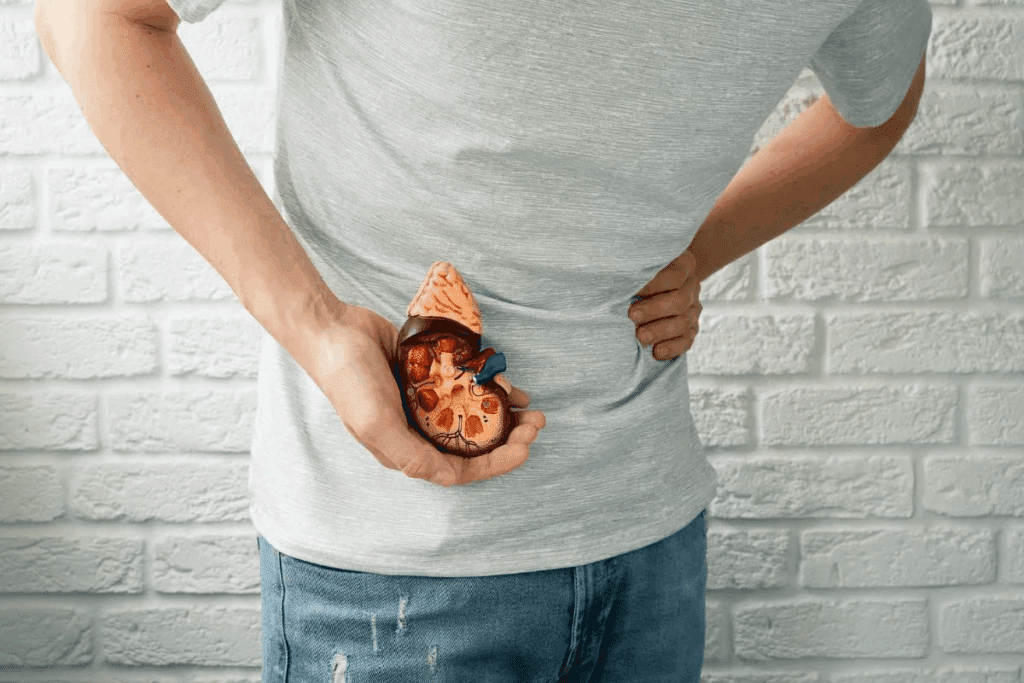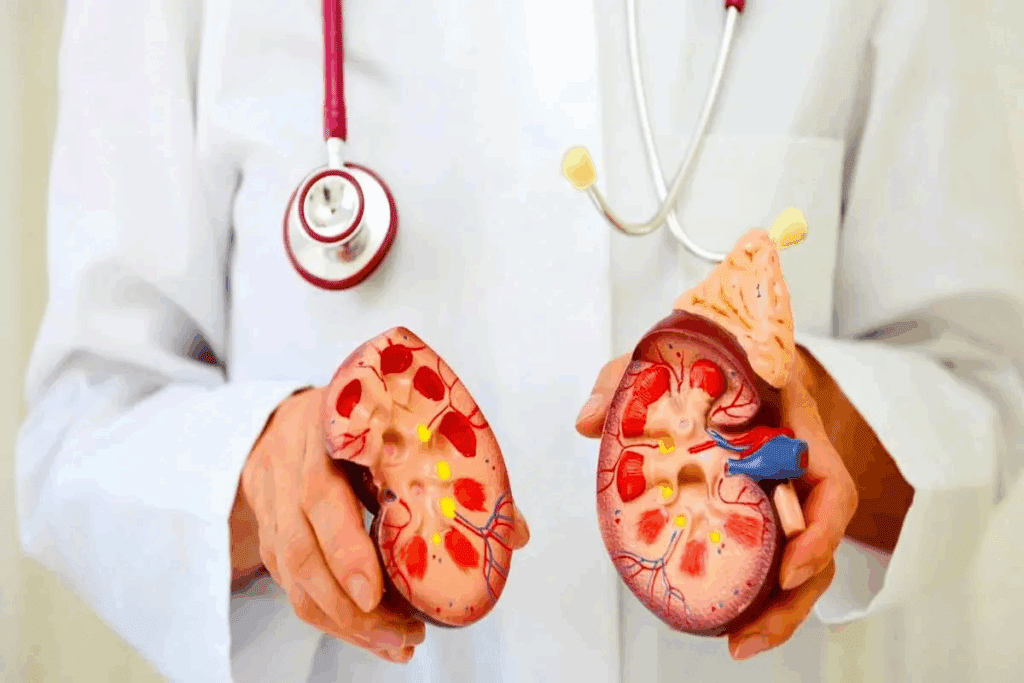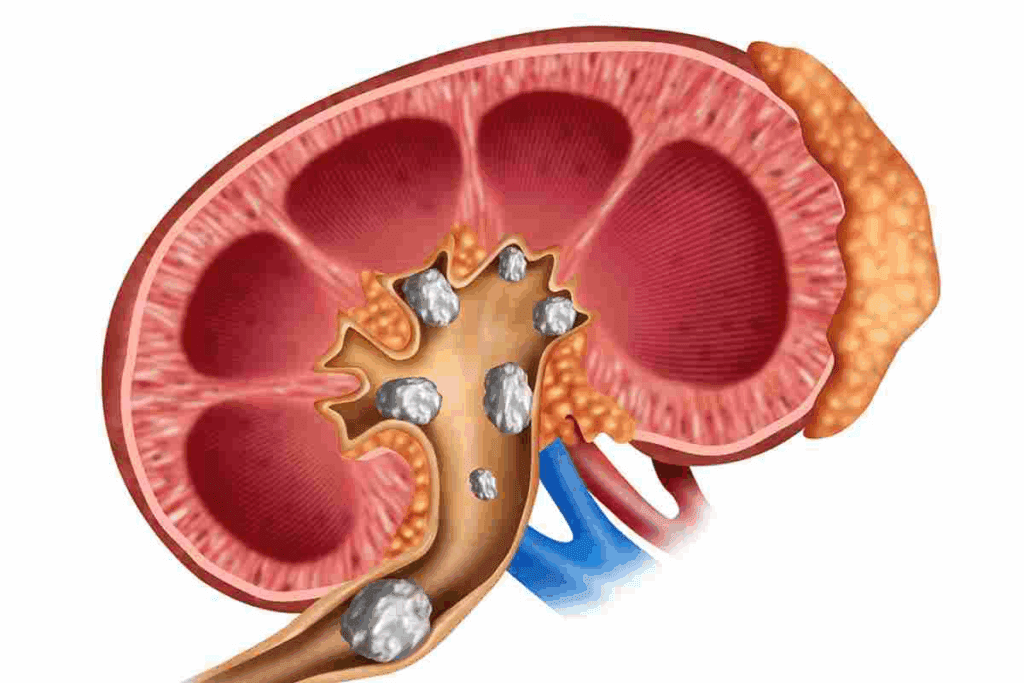Last Updated on November 25, 2025 by Ugurkan Demir

If you or a loved one has had kidney stones, you might wonder if they run in families. Research shows a strong link between a family history of kidney stones and a higher risk of getting them. Understand how family history impacts your kidney stone risk. Learncan kidney stones run in the family
About 1 in 11 people will get a kidney stone in their life. Around 12 percent of Americans get them again and again. Studies find that having a relative with kidney stones raises your risk. This is because of both genes and the environment.
At Liv Hospital, we aim to give top-notch healthcare. We support international patients, including those with a family history of kidney stones.

Research shows that people with a family history of kidney stones are at higher risk. Studies have found that having a family history increases the chance of getting kidney stones.
Studies have found a strong link between family history and kidney stones. Twin studies have given us important insights into the heritability of kidney stone disease.
These studies show that a big part of kidney stone disease is genetic. They suggest that kidney stones can be inherited. Specific genetic mutations play a role in increasing the risk.
Some research points to a 56% heritability rate for kidney stones. This high rate shows how important family history is in assessing kidney stone risk.
| Study | Heritability Rate | Sample Size |
| Twin Study 1 | 50% | 1000 twins |
| Twin Study 2 | 56% | 500 twins |
| Family History Study | Not specified | 2000 participants |
Knowing the genetic link to kidney stones is key for those at risk. It’s vital for individuals with a family history to be proactive. They should talk to healthcare professionals for tailored advice.

Studies show that having a family history of kidney stones raises your risk. At Liv Hospital, we check your risk and offer ways to prevent them.
Research finds that those with a relative who had kidney stones are at higher risk. The numbers are clear:
First-degree relatives are key in assessing kidney stone risk. We look at several factors:
Knowing these, we give you advice to lower your risk of kidney stones.
Key Takeaways:
Research shows that certain genetic mutations, like those in the CLDN14 gene, raise the risk of getting kidney stones. We’ll look into how these genetic factors lead to kidney stones and how they affect kidney health.
Changes in the CLDN14 gene are linked to a higher risk of kidney stones. This gene is key in keeping the right balance of calcium in the kidneys. When CLDN14 is mutated, it can cause too much calcium in the urine, which often forms stones.
Genetic changes, like those in CLDN14, can mess with how the kidneys handle ions. This can lead to an imbalance, raising the chance of stone formation. Knowing about these genetic links is vital for creating treatment plans for those with a family history of kidney stones.
| Gene Variant | Effect on Kidney Function | Risk of Kidney Stone Formation |
| CLDN14 | Alters paracellular permeability to cations like calcium | Increased risk due to higher calcium concentration in urine |
| Other related gene variants | Varies; can affect ion reabsorption or excretion | Varies; can increase or decrease risk depending on the mutation |
There are specific inherited disorders that increase the risk of kidney stones. These disorders go beyond common causes like diet and hydration. Knowing about these genetic conditions is key to proper care and management.
Cystinuria is a rare disorder that leads to cystine stones in the kidneys. It’s caused by mutations in the SLC3A1 and SLC7A9 genes. These genes control how cystine is transported in the kidneys.
People with cystinuria can’t absorb cystine well. This leads to cystine building up and forming stones. Symptoms include frequent kidney stones, which can be very painful. Early diagnosis and treatment are critical to avoid long-term damage and prevent more stones.
Other rare genetic conditions also cause kidney stones. These include:
These conditions show how genetics play a big role in kidney stone disease. For those with a family history of stones, knowing about these conditions can help in early detection and management.
Looking at your family’s medical history can help understand your risk for kidney stones. A detailed family history is key. It helps spot who might be more likely to get stones.
To document your family’s kidney stone history, start by asking relatives about their experiences. Ask your parents, siblings, and grandparents if they’ve had kidney stones. Also, note their age and any other health issues they have.
Creating a family tree with this info is also a good idea. It makes it easier to see patterns and possible genetic links. Keep this updated as new health news comes in.
When talking to your doctor about your family’s history, be thorough. Share the family tree and any health conditions. This helps your doctor figure out your risk and suggest ways to prevent or treat stones.
Talking about your family history can also reveal genetic risks. For example, some genes, like CLDN14, can increase your risk of stones. Knowing this, you and your doctor can make a better plan to manage your risk.
By documenting your family’s history and sharing it with your doctor, you’re taking a step towards preventing stones. This teamwork can lead to better health outcomes for you.
To understand kidney stone risk, we must look at both genetic and non-genetic factors. While genes are important, lifestyle and health can also play a big role. These factors can greatly affect a person’s chance of getting kidney stones.
What we eat is key in preventing kidney stones. Eating too much animal protein, sodium, and foods high in oxalate can raise the risk. Here’s why:
Drinking enough water is vital to prevent kidney stones. Not drinking enough can make urine more concentrated. This increases the risk of stones. We suggest drinking at least 2 liters of water a day to stay hydrated.
Some health issues can also raise the risk of kidney stones. These include:
By managing these non-genetic risk factors, people with a family history of kidney stones can lower their risk. This is important for those who may be more likely to develop stones.
Some prescription drugs can raise the chance of getting kidney stones in people who are already at risk. This is very important for those with a family history of kidney stones. Knowing which drugs can increase this risk helps in managing and possibly lowering the chance of getting kidney stones.
Many medications can increase the risk of kidney stones. Diuretics, used for high blood pressure and swelling, can make urine more likely to form stones. Topiramate, a drug for seizures, also raises the risk by changing urine pH and composition.
Other drugs that might lead to kidney stones include:
If you’re at risk for kidney stones and taking drugs that could raise this risk, talk to your doctor about other options. Medication adjustments or alternative treatments might lower your risk of stone formation.
We suggest that you:
By working with your healthcare provider, you can lower the risks from your genetic predisposition and medication use.
If you have a family history of kidney stones, taking steps to prevent them is key. We suggest a mix of diet changes, drinking plenty of water, and lifestyle tweaks.
The type of stone you’re likely to get affects your diet. For example, if you’re at risk for calcium oxalate stones, eat less spinach, beets, and rhubarb. If you’re at risk for uric acid stones, cut down on foods high in purines like organ meats and some seafood.
Also, eating less sodium is good for most people. A diet full of fruits, veggies, and whole grains helps too. These foods are packed with nutrients and fiber, which can prevent stones.
Drinking enough water is key to avoiding kidney stones. Aim to make at least 2 liters of urine a day. This helps dilute substances that could form stones. Remember, how much fluid you need can change based on your activity level, climate, and more.
For some, drinking lemonade or orange juice might be suggested. These have citrate, which can help prevent stones.
Changing your diet and drinking enough water are just the start. Staying at a healthy weight and exercising regularly also help. Plus, managing any health issues that might raise your risk is important.
Being proactive about your health can really help if you have a family history of kidney stones. By following these tips, you can lower your risk of getting stones.
We provide detailed diagnostic testing for those at risk of kidney stones due to family history. It’s key to know the risk of getting these stones. Testing helps find the reasons behind stone formation.
Genetic tests can spot specific genes linked to kidney stones, like the CLDN14 gene. Knowing these genes helps us create better treatment plans. This way, we can lower the chance of stones coming back.
Some genetic tests we offer include:
Metabolic tests are key to figuring out why kidney stones form. They check how the body handles calcium, oxalate, and uric acid.
| Metabolic Evaluation | Description | Importance |
| Calcium Metabolism Assessment | Looks at how the body deals with calcium | Helps find hypercalciuria, a big risk for stones |
| Oxalate Metabolism Assessment | Checks oxalate levels and how much is lost | Finds hyperoxaluria, which can cause stones |
| Uric Acid Metabolism Assessment | Studies how much uric acid is made and lost | Diagnoses hyperuricosuria, which raises stone risk |
By mixing genetic tests with metabolic checks, we get a full picture of stone risk. This info lets us make specific plans to prevent more stones.
Hereditary kidney stone formers need a treatment plan that’s just for them. It’s not just about treating symptoms. It’s about looking at their genes, the type of stone, and their health.
Medicine is key for those with a family history of kidney stones. We pick the right medicine based on their genes. For example, people with cystinuria get medicine to help with cystine stones.
Key medication strategies include:
Medicine is important, but some may need surgery for stones. We look at surgery for big, painful, or infected stones. New surgery methods like shock wave lithotripsy (SWL) and ureteroscopy work well and don’t take long to recover from.
Factors influencing the choice of surgical intervention include:
By using medicine and surgery when needed, we help hereditary stone formers a lot. This approach lowers the chance of stones coming back and makes life better.
If you have a family history of kidney stones, knowing when to seek medical help is important. People with a family history should watch for warning signs that mean they need to see a doctor. Regular check-ups and quick action can help avoid serious problems.
Some symptoms are a clear sign that you need to see a doctor right away. Severe pain, difficulty urinating, and fever are signs that should not be ignored. If you have any of these, get medical help fast.
Regular check-ups are key for those with a family history of kidney stones. We suggest you see your doctor regularly. This includes urine analysis and imaging tests as your doctor recommends.
Being aware of your health and watching for signs can greatly lower the risk of kidney stone problems.
Managing kidney stone risk is possible with the right approach. Knowing your genetic predisposition is key, if you have a family history of kidney stones. Studies show that people with a family history are more likely to get kidney stones. This is because some genes can make stone formation more likely.
By changing risk factors and following preventive steps, you can lower your chance of getting kidney stones. At Liv Hospital, we focus on a complete plan to manage kidney stone risk. This includes changing your diet, drinking enough water, and making lifestyle changes that fit your needs.
If you have a family history of kidney stones, it’s vital to work with your healthcare provider. Together, you can create a plan that’s just for you. By being proactive, you can manage your risk and lower the chance of getting kidney stones again. We’re here to support you in keeping your kidneys healthy.
Yes, having a relative with kidney stones raises your risk. This is due to both genes and environment.
About 56 percent of kidney stone risk comes from genes. This means genetics play a big role.
Certain genetic changes, like in the CLDN14 gene, increase stone risk.
Knowing your family’s stone history is key. Share this with your doctor to get better care.
Yes, diet, hydration, and health conditions also raise risk. Changing these can lower it.
Yes, some meds can up the risk for those already at risk. Talk to your doctor about safer options.
Eat right, drink plenty, and make lifestyle changes. These depend on your stone type and risk.
Genetic and metabolic tests help tailor your care. They give important info for prevention and treatment.
We offer meds based on your genes and surgery for frequent stones. Our goal is to care for you personally.
If you have a family history, watch for warning signs. Early monitoring and action can stop problems.
Subscribe to our e-newsletter to stay informed about the latest innovations in the world of health and exclusive offers!